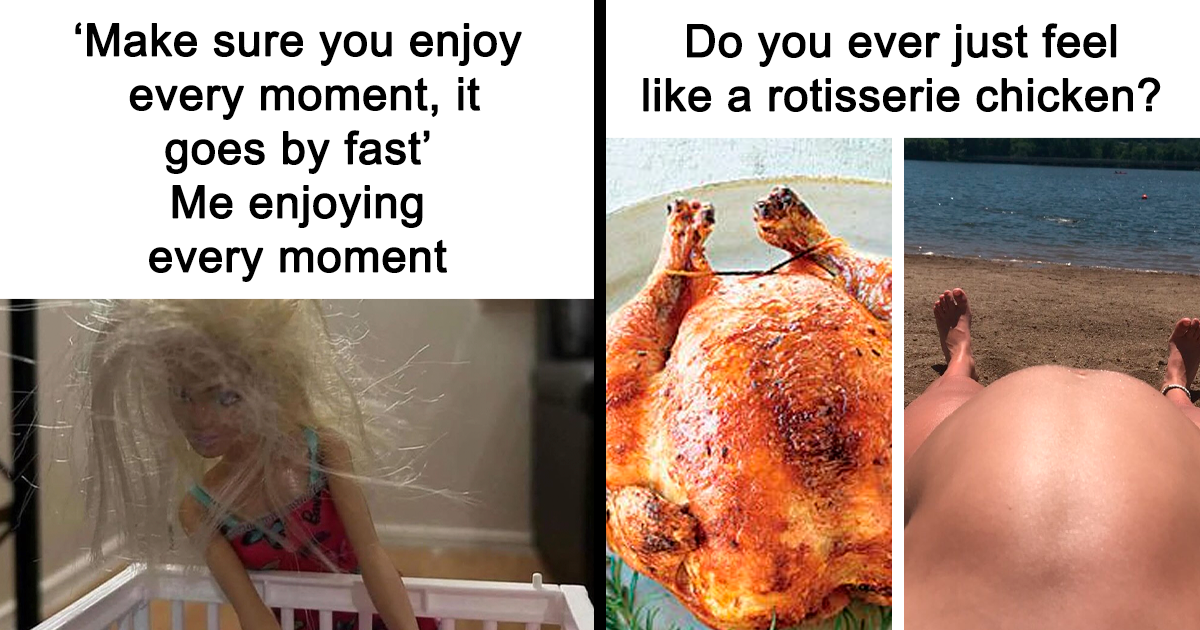“Shocking Cultural Differences: What Americans Don’t Realize About the Rest of the World, According to a New Zealand TikToker”
Ever landed in a place where a simple loaf of potato bread sparks a full-on cultural meltdown? Yeah, me too. Culture shock isn’t just about crazy language barriers or drastically different foods — it’s those tiny, eyebrow-raising moments that make you question everything you thought you knew about “normal.” Whether it’s having to flash your ID just to buy nasal spray (seriously, what is going on?) or figuring out why American stores are basically mini cities inside Target, adjusting to a new culture can feel like decoding an elaborate joke nobody’s explaining. Jazz Thornton, a sharp-witted Kiwi mental health advocate, dives headfirst into the whirlwind of culture shock after moving to the US for work, turning her baffled discoveries into viral TikTok gold. From school start times that could traumatize any teenager to the mystical world of tipping and jaw-dropping portion sizes, Jazz’s hilarious observations make you laugh, think, and maybe even scratch your head in disbelief. Ready to see America through the eyes of someone who’s genuinely puzzled and wildly entertained? Let’s jump in. LEARN MORE.
It might be difficult to adjust yourself to a new culture. Whether it’s leisurely travel, work-related trips, or other voyages, immersing yourself in a new setting can bring up all sorts of emotions. They are part of the culture shock phenomena, caused by a sudden change in the environment after coming to a new location.
Each place takes time to get used to. And it doesn’t have to be a land far far away for you to feel culture shock. Differences as minor as unfamiliar hand gestures can cause confusion, let alone a new language, food, and climate, among others, that all require getting accustomed to. Research suggests that there are four stages of cultural shock that expats might encounter after relocating: the honeymoon phase, the frustration phase, the adaptation phase, and the acceptance phase. Some might be easier to bear than others, but in the long run, going through them makes the place more of a home away from home rather than a stop somewhere in between.
In some cases, it doesn’t necessarily have to be moving to a new place—a short-term trip can be enough to experience culture shock. That was Jazz Thornton’s case after relocating to the United States because of work-related reasons. A New Zealander at heart, she is a mental health activist, an author, and now—an unofficial connoisseur of everything that is unusual for foreigners in the US. She documented her journey of dealing with culture shock in the new destination and shared it with her followers on TikTok. The lighthearted videos quickly went viral, as she covered everything from specific foods to humorously large stores, which Jazz grew to love.
Jazz shared her personal experience with culture shock after relocating to the US in her TikTok videos
@notjazzthornton What is potato bread. #usa #la #nz ♬ original sound – Not Jazz
 I will never get over the fact that most of y’all start school at 7:30 in the morning. I’ve done a video on this already, but the fact that y’all start at 7 am. And we are here starting at 9 am. Teenagers aren’t functioning at 7:30 in the morning. Blows my mind.
I will never get over the fact that most of y’all start school at 7:30 in the morning. I’ve done a video on this already, but the fact that y’all start at 7 am. And we are here starting at 9 am. Teenagers aren’t functioning at 7:30 in the morning. Blows my mind.
 Pharmaceutical TV ads, what the frick is this? Every time that I’ve gone to watch TV, there have been at least 15 pharmaceutical commercials. There was one that I was watching yesterday that was for an antidepressant. And it was like this video of this woman holding around the sign of a smiley face to her doctor. Now I’m an absolute believer that medication can 100% help. But why are we putting antidepressants on TV? Why are they commercialized? And then there’s like a 15-second list of the side effects of this is everything that’s going to happen if you’re going to take these medications. Why? Why are these TV adverts? Does America know that the rest of the world doesn’t do that?
Pharmaceutical TV ads, what the frick is this? Every time that I’ve gone to watch TV, there have been at least 15 pharmaceutical commercials. There was one that I was watching yesterday that was for an antidepressant. And it was like this video of this woman holding around the sign of a smiley face to her doctor. Now I’m an absolute believer that medication can 100% help. But why are we putting antidepressants on TV? Why are they commercialized? And then there’s like a 15-second list of the side effects of this is everything that’s going to happen if you’re going to take these medications. Why? Why are these TV adverts? Does America know that the rest of the world doesn’t do that?
 Okay, just trying to get my head around the American minimum wage and tipping situation. So I confirmed that where I’m from, the minimum wage is $21.20. No matter where you are, if you’re a waitress, that’s the minimum of how much you’re earning. I’ve seen comments on my video being like, some people in America are making like $2.50 an hour. How, how is that legal? Because the thing that I can’t comprehend, right, is that when converted, the amount that we’re paying for food in the United States when we go out is pretty much the same amount that we are paying here. Where is the money going? Like when we pay for our food here, the waiters, the amount that they’re making is covered by what we pay. And in America, we’re paying the same amount, but then if we tip on top, where is the money going?
Okay, just trying to get my head around the American minimum wage and tipping situation. So I confirmed that where I’m from, the minimum wage is $21.20. No matter where you are, if you’re a waitress, that’s the minimum of how much you’re earning. I’ve seen comments on my video being like, some people in America are making like $2.50 an hour. How, how is that legal? Because the thing that I can’t comprehend, right, is that when converted, the amount that we’re paying for food in the United States when we go out is pretty much the same amount that we are paying here. Where is the money going? Like when we pay for our food here, the waiters, the amount that they’re making is covered by what we pay. And in America, we’re paying the same amount, but then if we tip on top, where is the money going?
 This time a good one – Target. Listen, I went in today to buy a hairbrush. Unbeknown to me that Target has everything that you could ever want. Grocery shopping, Target, clothes, Target. All hair/beauty care, Target. Socks, Target, electronics, Target, smoothies and watermelon, Target. You want to know what else I got from Target? Christmas pajamas. Where I’m from in New Zealand, we have nothing like this. Our closest is like, Kmart, and it doesn’t even compare. Take all of my money, Target
This time a good one – Target. Listen, I went in today to buy a hairbrush. Unbeknown to me that Target has everything that you could ever want. Grocery shopping, Target, clothes, Target. All hair/beauty care, Target. Socks, Target, electronics, Target, smoothies and watermelon, Target. You want to know what else I got from Target? Christmas pajamas. Where I’m from in New Zealand, we have nothing like this. Our closest is like, Kmart, and it doesn’t even compare. Take all of my money, Target
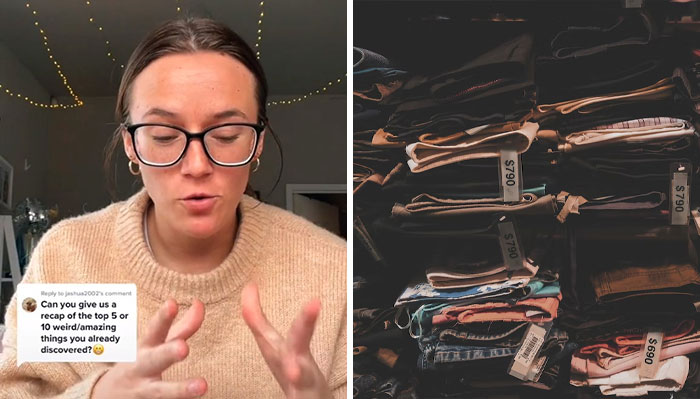 The fact that when you go to buy something, right, you go up to the counter, the price that is displayed on the tag is not the price that you pay at the counter because taxes are added on after. Now I understand this is like a state-by-state thing but oh my goodness, it took my head a hot minute to get around.
The fact that when you go to buy something, right, you go up to the counter, the price that is displayed on the tag is not the price that you pay at the counter because taxes are added on after. Now I understand this is like a state-by-state thing but oh my goodness, it took my head a hot minute to get around.
 Why is it that when you’re at a restaurant or a diner or something like that, and you go to pay for your food, you put the card on the thing and they take your card away from you? They walk away with your card to the back of wherever they are, to put the payment through. Y’all wonder why you have so much fraud. There is no way that at some point when you’ve done that, someone hasn’t taken a photo of your credit card. Like in New Zealand and everywhere else that I’ve gone, we just pay at the counter or we pay in front of us. We ain’t giving our cards to no one. Surely there is a better system for this in the United States. Like I believe 90% of people would be good, but there’s got to be someone that has taken photos of people’s cards when they go behind. Why are we doing this? Can’t y’all just pay at the front counter?
Why is it that when you’re at a restaurant or a diner or something like that, and you go to pay for your food, you put the card on the thing and they take your card away from you? They walk away with your card to the back of wherever they are, to put the payment through. Y’all wonder why you have so much fraud. There is no way that at some point when you’ve done that, someone hasn’t taken a photo of your credit card. Like in New Zealand and everywhere else that I’ve gone, we just pay at the counter or we pay in front of us. We ain’t giving our cards to no one. Surely there is a better system for this in the United States. Like I believe 90% of people would be good, but there’s got to be someone that has taken photos of people’s cards when they go behind. Why are we doing this? Can’t y’all just pay at the front counter?
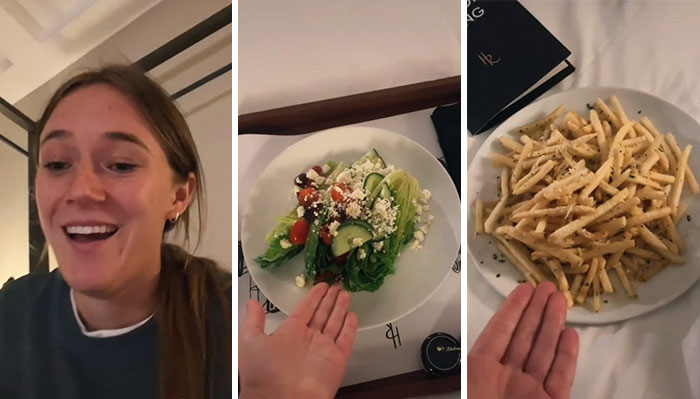 I just ordered room service at my hotel and I ordered a salad with a side of fries. You want to know what I got? This is my salad. This is my fries. I have fries with a side of salad. Look at the size. Look, I ain’t mad because I love potatoes. Dang.
I just ordered room service at my hotel and I ordered a salad with a side of fries. You want to know what I got? This is my salad. This is my fries. I have fries with a side of salad. Look at the size. Look, I ain’t mad because I love potatoes. Dang.
 Why is it that almost every public bathroom that I’ve been in, like airports or shopping malls or anything like that, has such wide gaps in the door? Like on either side of the door, there is a huge gap, and people can just see straight through it. This is from LAX airport where I was yesterday. But this has been a common thing just everywhere that I’ve gone in the States. I get so sad. Can someone please tell me why this is necessary? And why are the gaps under the door so high? That’s all
Why is it that almost every public bathroom that I’ve been in, like airports or shopping malls or anything like that, has such wide gaps in the door? Like on either side of the door, there is a huge gap, and people can just see straight through it. This is from LAX airport where I was yesterday. But this has been a common thing just everywhere that I’ve gone in the States. I get so sad. Can someone please tell me why this is necessary? And why are the gaps under the door so high? That’s all
 This one is something that we’re all thinking about, I don’t think any of us know how to explain your freaking measuring system, the imperial system of measurement. I have never been more confused in my entire life than trying to understand the weather here in America or how much someone weighs or how tall someone is or how far away something is. But I’ve come to a conclusion. Okay, listen, I think that America likes everything really big and brilliantly large. Okay. When it comes to the weather, when it’s freezing for us, and it’s really cold, it gets like zero degrees, right? Make sense? Then when it’s hot, it’s like, kind of 30s, but in America, cold is like what, like 30/40? And hot is way higher. You just want the numbers to be bigger. Same thing with pounds. Everything just could be bigger. Literally, the rest of the world is using the metric system. Come on, fam.
This one is something that we’re all thinking about, I don’t think any of us know how to explain your freaking measuring system, the imperial system of measurement. I have never been more confused in my entire life than trying to understand the weather here in America or how much someone weighs or how tall someone is or how far away something is. But I’ve come to a conclusion. Okay, listen, I think that America likes everything really big and brilliantly large. Okay. When it comes to the weather, when it’s freezing for us, and it’s really cold, it gets like zero degrees, right? Make sense? Then when it’s hot, it’s like, kind of 30s, but in America, cold is like what, like 30/40? And hot is way higher. You just want the numbers to be bigger. Same thing with pounds. Everything just could be bigger. Literally, the rest of the world is using the metric system. Come on, fam.
 We just went to CVS, the pharmacy, to pick up some stuff and I have a question. Why, in the pharmacy, is there a whole aisle of alcohol? Ya’ll sell massive bombs of alcohol at the pharmacy? Like, at the pharmacy. That is not something that we do in New Zealand or anywhere that I’ve been. Can someone explain, please?
We just went to CVS, the pharmacy, to pick up some stuff and I have a question. Why, in the pharmacy, is there a whole aisle of alcohol? Ya’ll sell massive bombs of alcohol at the pharmacy? Like, at the pharmacy. That is not something that we do in New Zealand or anywhere that I’ve been. Can someone explain, please?
 This one, LA, I’m talking to you. I’m in Los Angeles at the moment and it is raining outside. And it is by far one of the most entertaining things watching people in Los Angeles navigate how to work with rain. It’s like, you just malfunction like you don’t know what to do. Y’all don’t know how to drive in the rain, you don’t know how to walk in the rain. But this is by far my favorite. Why were like 80% of the people that I saw when I was walking around today, wearing these plastic ponchos? Like, y’all don’t own jackets or umbrellas, so everyone’s just wearing a plastic poncho. And look, fair enough. It doesn’t rain here, so I understand. But you got to know it’s really funny. This is like the third time it’s rained in LA since I’ve been here. Please invest in some umbrellas and a raincoat.
This one, LA, I’m talking to you. I’m in Los Angeles at the moment and it is raining outside. And it is by far one of the most entertaining things watching people in Los Angeles navigate how to work with rain. It’s like, you just malfunction like you don’t know what to do. Y’all don’t know how to drive in the rain, you don’t know how to walk in the rain. But this is by far my favorite. Why were like 80% of the people that I saw when I was walking around today, wearing these plastic ponchos? Like, y’all don’t own jackets or umbrellas, so everyone’s just wearing a plastic poncho. And look, fair enough. It doesn’t rain here, so I understand. But you got to know it’s really funny. This is like the third time it’s rained in LA since I’ve been here. Please invest in some umbrellas and a raincoat.
 Why is your toothpaste locked away at CVS? What what? What are people doing with toothpaste that requires it to be locked away? And also how come the aisle next to it had alcohol that wasn’t locked away but the toothpaste was locked away? But there was like, a couple of toothpaste that wasn’t, but like, most of them were. This is in the CVS in New York. And so if you have any insight, please let me know, what are people doing with toothpaste? What? What is going on? Live, laugh, love America.
Why is your toothpaste locked away at CVS? What what? What are people doing with toothpaste that requires it to be locked away? And also how come the aisle next to it had alcohol that wasn’t locked away but the toothpaste was locked away? But there was like, a couple of toothpaste that wasn’t, but like, most of them were. This is in the CVS in New York. And so if you have any insight, please let me know, what are people doing with toothpaste? What? What is going on? Live, laugh, love America.
 As you can probably hear, I’m a little bit stuffed up in my sinuses today. So you know what I did, I went over to Target and I went over to CVS to try and just get some nasal spray. Never in my entire life have I been IDed to get the nasal spray. Like, I was just at the checkout and trying to buy my stuff and this big alert comes up and it’s like “Please present your ID”. What are Americans doing with nasal spray that requires you to be IDed? It’s also raining outside today and I didn’t have my ID on me so I had to go all the way back to the hotel to get my ID to go back to buy nasal spray. Can someone in America please inform me as to why? Why we’re not trusting you with a nasal spray?
As you can probably hear, I’m a little bit stuffed up in my sinuses today. So you know what I did, I went over to Target and I went over to CVS to try and just get some nasal spray. Never in my entire life have I been IDed to get the nasal spray. Like, I was just at the checkout and trying to buy my stuff and this big alert comes up and it’s like “Please present your ID”. What are Americans doing with nasal spray that requires you to be IDed? It’s also raining outside today and I didn’t have my ID on me so I had to go all the way back to the hotel to get my ID to go back to buy nasal spray. Can someone in America please inform me as to why? Why we’re not trusting you with a nasal spray?
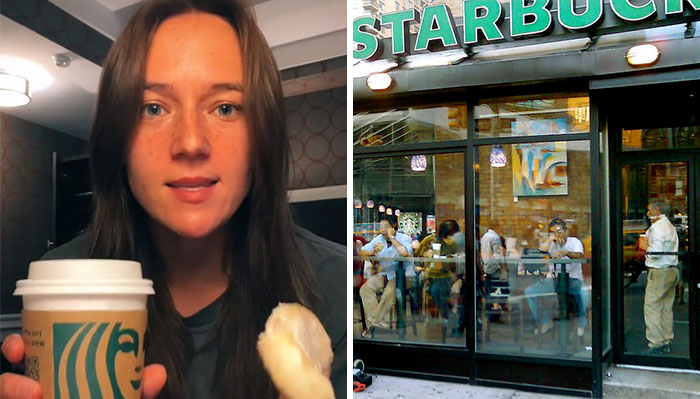 Now listen, I couldn’t tell you how many trips I’ve now made to the United States of America. But I can tell you that there are two things that I have discovered that people here go wild over. Now, the first one I discovered yesterday, okay, I was walking down the street in New York City, and I see this line of middle-aged men in suits and the line is very long, it wraps around the side of a building. And I’m like, what is going on? There are like, 35 men in this line. What is happening, right? Actually, I go check it out, because I’m like, what exciting thing is making all of these middle-aged men line up? It was a salad bar, like sweet green, I think. A salad bar has men in suits lining up outside around the corner. I haven’t ever seen anything like that. The second thing that makes y’all lose your mind is Starbucks. Someone tell me why, when I went to get my starbies this morning, right on the one just on the corner here, the line went out the door and there were like 50 people in the store waiting for their Starbucks. What do they put in this thing that makes everyone go so hype? Including me.
Now listen, I couldn’t tell you how many trips I’ve now made to the United States of America. But I can tell you that there are two things that I have discovered that people here go wild over. Now, the first one I discovered yesterday, okay, I was walking down the street in New York City, and I see this line of middle-aged men in suits and the line is very long, it wraps around the side of a building. And I’m like, what is going on? There are like, 35 men in this line. What is happening, right? Actually, I go check it out, because I’m like, what exciting thing is making all of these middle-aged men line up? It was a salad bar, like sweet green, I think. A salad bar has men in suits lining up outside around the corner. I haven’t ever seen anything like that. The second thing that makes y’all lose your mind is Starbucks. Someone tell me why, when I went to get my starbies this morning, right on the one just on the corner here, the line went out the door and there were like 50 people in the store waiting for their Starbucks. What do they put in this thing that makes everyone go so hype? Including me.
 You guys figure out a way to put everything in bags. Do people in America really not have enough time to cook their own eggs? What? Why? Why are we putting eggs in a bag? Look, I’m not hurting, it just seems a little bit unnecessary. They also have a bag for like, a whole pickle. And that’s the package. Goodness led me to discover sliced pickles in a bag. I tried the whole pickle the other day on my Instagram and everyone was like no, you have to get the slices.
You guys figure out a way to put everything in bags. Do people in America really not have enough time to cook their own eggs? What? Why? Why are we putting eggs in a bag? Look, I’m not hurting, it just seems a little bit unnecessary. They also have a bag for like, a whole pickle. And that’s the package. Goodness led me to discover sliced pickles in a bag. I tried the whole pickle the other day on my Instagram and everyone was like no, you have to get the slices.
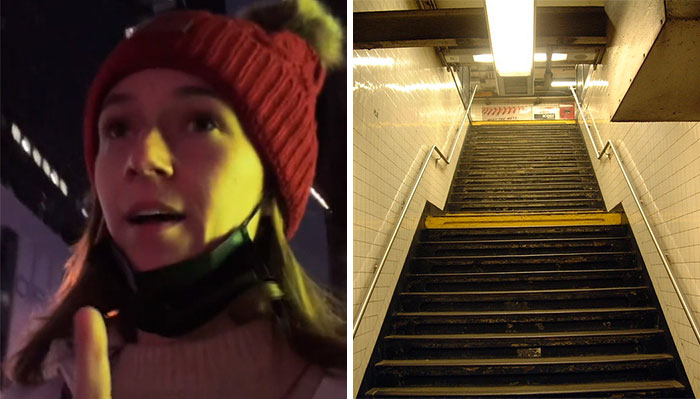 New York, this one’s for you. Look, I have been here for the last couple of weeks, right? And I just have a question. The subway. Do New Yorkers have a specific kind of calf leg strength? Like every time you go on the subway. There are like 100 stairs. We’re out here puffing, my asthmatic lungs are not born for New York. Like are you getting trained in school? Is there Subway training on, like, your legs? Are y’all out here with just the killer calf muscles? Please let me know
New York, this one’s for you. Look, I have been here for the last couple of weeks, right? And I just have a question. The subway. Do New Yorkers have a specific kind of calf leg strength? Like every time you go on the subway. There are like 100 stairs. We’re out here puffing, my asthmatic lungs are not born for New York. Like are you getting trained in school? Is there Subway training on, like, your legs? Are y’all out here with just the killer calf muscles? Please let me know
 Today I’m trying Twinkies. We don’t have these in New Zealand, but I’ve heard a lot about them so I’m going to try them. I’ve heard that they have a shelf expectancy that’s like, longer than my life, so I’m scared. Don’t know how I feel about this. What the frick, Americans, why? This isn’t it for me.
Today I’m trying Twinkies. We don’t have these in New Zealand, but I’ve heard a lot about them so I’m going to try them. I’ve heard that they have a shelf expectancy that’s like, longer than my life, so I’m scared. Don’t know how I feel about this. What the frick, Americans, why? This isn’t it for me.
 I’m in New York because I have a question. Okay, what is this? And why are there so many of them? This is the most unintimidating cop car I have seen in my entire life. There are so many variations of the mini cars and I can’t really imagine a really big tough cop driving in this tiny little car that’s literally smaller than a human. Someone, please inform me.
I’m in New York because I have a question. Okay, what is this? And why are there so many of them? This is the most unintimidating cop car I have seen in my entire life. There are so many variations of the mini cars and I can’t really imagine a really big tough cop driving in this tiny little car that’s literally smaller than a human. Someone, please inform me.
Auto Amazon Links: No products found.





